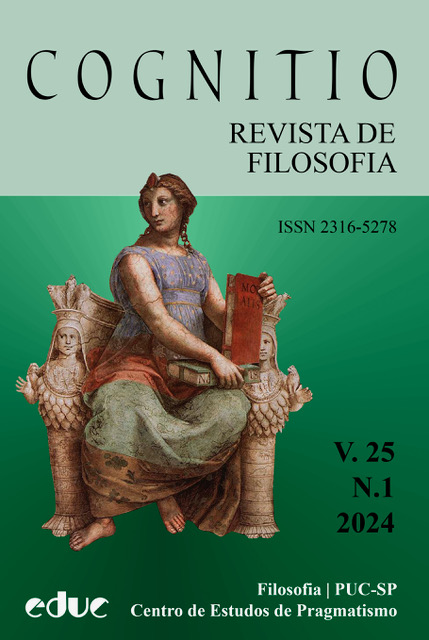A leitura neopragmatista de Rorty sobre Foucault
ruptura ou continuidade da visão de subjetividade moderna
DOI:
https://doi.org/10.23925/2316-5278.2024v25i1:e64392Palavras-chave:
Cuidado de si, Neopragmatismo, Subjetividade, VerdadeResumo
O objetivo deste artigo foi investigar a leitura neopragmatista de Richard Rorty (1931-2007) sobre a concepção de subjetividade em Michel Foucault (1926-1984). Rorty ficou conhecido como um celebre filósofo que se opôs à concepção moderna de sujeito, sobretudo, o excesso de antropocentrismo e cientificismo. Quanto ao filósofo francês Michel Foucault, pode-se constatar no terceiro domínio de sua produção teórica, a presença de uma investigação vigorosa sobre a constituição do sujeito. Inicialmente, percebe-se desde seus primeiros escritos, o papel que exerce o poder e a verdade enquanto mecanismos criadores de subjetividade, impondo aos sujeitos modos de ser e de relacionar-se consigo e com os outros. Todavia, a análise sobre a questão da constituição do sujeito se configura de forma mais delimitada nos cursos Subjetividade e Verdade (1981) e A Hermenêutica do Sujeito (1982). Foucault desenvolve uma investigação sobre a subjetividade a partir das noções de ética, filosofia, espiritualidade, sexualidade, arte de viver e cuidado de si, buscando compreender como o sujeito torna-se assujeitado pelo poder e saber, sugerindo novos modos de subjetividade, diferentes daqueles propostos pelo poder. Entretanto, contrariamente ao que propôs Foucault, o filósofo norte-americano neopragmatista Richard Rorty, conhecido por propor uma filosofia edificante, afirma na obra Contingência, ironia e solidariedade (2007) que as ideias do filósofo francês, embora tentem se desvencilhar da concepção moderna de subjetividade, ainda se mantêm atreladas a ela. Assim, pretende-se explorar os argumentos rortyanos que justificam às objeções a Foucault, e com base na análise de textos específicos de ambos os autores, se busca identificar os argumentos usados por Rorty para acusar Foucault de permanecer no quadro teórico da modernidade.
Referências
ARAÚJO, Inês Lacerda. Subjetividade e linguagem são mutuamente excludentes?. Princípios, v. 14, n. 21, p. 83-103, jan./jun. 2007.
DUARTE, André. Heidegger e Foucault, críticos da modernidade: humanismo, técnica e biopolítica. Trans/Form/Ação, v. 29, n. 2, p. 95-114, 2006. https://doi.org/10.1590/S0101-31732006000200008
FOUCAULT, M. A ética do cuidado de si como prática da liberdade. In: MOTTA, M. B. (Org.). Ética, sexualidade, política: Ditos e escritos V. Trad. E. Monteiro e I. Barbosa. Rio de Janeiro: Forense Universitária. 1984/2004. p. 264- 287.
FOUCAULT, Michel. A Hermenêutica do sujeito: curso dado no Collège de France (1981-1982). Trad. Márcio Alves da Fonseca e Salma Tannus Muchail. 3ª ed. São Paulo: Editora Martins Fontes, 2010.
FOUCAULT, Michel. A História da sexualidade I: a vontade de saber. Trad. Maria Thereza da Costa Albuquerque e J. A. Guilhon Albuquerque. Rio de Janeiro: Edições Graal, 1988.
FOUCAULT, Michel. As palavras e as coisas. São Paulo: Martins Fontes, 1995.
FOUCAULT, Michel. A verdade e as formas jurídicas. RJ-RJ, NAU. 3ª ed. 2009.
FOUCAULT, Michel. Dits et Écrits. Tome I. Paris: Gallimard, 1994.
FOUCAULT, Michel. Subjetividade e Verdade: curso no Collège de France (1980-1981). Trad. Rosemary Costhek Abílio. São Paulo: Editora Martins Fontes, 2016.
FOUCAULT, Michel. Vigiar e punir: nascimento da prisão. Trad. Raquel Ramalhete. Petrópoles: Vozes, 1987.
MUCHAIL, Salma Tannus. Foucault, Mestre do cuidado. Edições Loyola: São Paulo, 2011.
ROCHA, Maria José. A crítica de Richard Rorty à Teoria do Conhecimento e uma possibilidade de Redescrição. Revista Redescrições – Revista online do GT de Pragmatismo. v. 3, n. 3, p. 71-80, 2012.
RORTY, Richard. A Filosofia e o espelho da natureza. Trad. Antônio Trânsito. São Paulo: Relume Dumará, 1994.
RORTY, Richard. Consequências do pragmatismo. Trad. de João Duarte. Lisboa: Instituto Piaget, 1982.
RORTY, Richard. Contingência, Ironia e Solidariedade. Trad. Vera Ribeiro. São Paulo: Martins, 2007.
Downloads
Publicado
Como Citar
Edição
Seção
Licença
Copyright (c) 2024 http://creativecommons.org/licenses/by/4.0/

Este trabalho está licenciado sob uma licença Creative Commons Attribution 4.0 International License.









